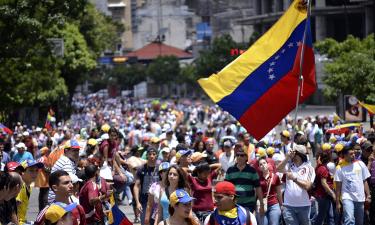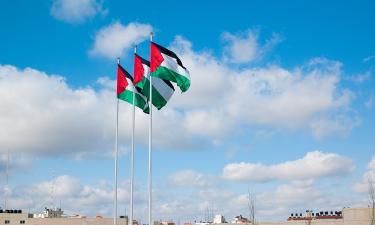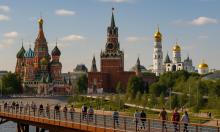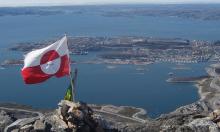Public lashing or corrupt elites: What is happening in South Africa
The Republic of South Africa, formerly a BRICS member, is going through its worst crisis since the end of the apartheid era.
72 people killed in riots in South Africa
South African President Cyril Ramaphosa sent 25,000 troops to stop looting and riots in different parts of the country.
The press calls the ongoing unrest "the worst wave of violence" since the end of apartheid in 1994: on Tuesday, July 13, 72 people were killed in the riots, more than 1,700 people were arrested.
Protesters demand the release of Jacob Zuma (79) who served as South African president from 2009 to 2018. Both Zuma and Ramaphosa represent the African National Congress Party (ANC). The unrest is centred in the eastern province of KwaZulu-Natal, where the former president comes from, as well as in parts of Pretoria and Johannesburg, the country's economic capital.
The protests sparked on July 9, the day after Zuma was imprisoned. He was sentenced to 15 months of strict imprisonment for "contempt of justice" — he refused to appear at the hearings, at which he was accused of corruption cases.
The authorities say that dozens of camouflaged activists, who claim to be veterans of the ANC liberation struggle against apartheid, are leading the riots.
Bheki Cele, the Security Minister of the country, who has been criticized for failing to anticipate and deal with the riots, warned that people should not take justice into their own hands. According to him, it is also irresponsible to gather at the peak of the "aggressive third wave" of the COVID-19 pandemic that has already claimed the lives of 64,000 South Africans as of July 2021.
Who is Jacob Zuma
Like all South African presidents, in the post-apartheid era, Zuma was fighting for freedom in the ranks of the ANC along with Nelson Mandela.
During the years of his presidency, after several years of media bullying in connection with corruption cases and a vote of no confidence at the parliament, Jacob Zuma stepped down. Currently, Zuma faces 16 charges on counts of
- corruption,
- racketeering,
- fraud
- money laundering.
During his presidency, as critics say, billions of dollars were funnelled from the state into the pockets of officials and their families.
For example, an investigation conducted by British law firm Bowmans, revealed that the contracts of energy firm Eskom, which is building two coal power plants worth $12 billion, were "dubious, overpriced or corrupt."
There is also the case of the 1999 arms deal, in which Zuma allegedly took bribes from a French arms manufacturer.
The WSJ wrote that Zuma's arrest was seen as a victory for his successor (Ramaphosa), who promised to cleanse the South African government and the ruling ANC from corruption.
However, the escalation of unrest has also drawn attention to ongoing inter-factional struggles within the former liberation movement, in which Zuma continues to enjoy great support, the American publication wrote.
In 2019, Zuma, speaking at panel hearings, said that the UK and the US were still part of an elaborate conspiracy to demonise him as he was trying to bring about political and economic change in South Africa. According to Zuma, certain agents, who were trained abroad, attempted to poison him, although he did not give names.
Still, it appears that the United States did have motives for the political elimination of the South African president. He took an active part in the opposition of the BRICS to American globalism. As Zuma and Brazilian left-wing leaders left the political scene (who were also convicted of corruption, as it now turns out, by biased judges who received instructions from the United States), BRICS had lost its role in global agenda by now.
In a comment for Pravda. Ru Honorary Doctor, Chief Researcher, Doctor of Historical Sciences at the University of the Western Cape (South Africa), Vladimir Shubin, noted that "no external forces removed Zuma." In his opinion, this is "a phenomenon of its own within South Africa."
Vladimir Shubin believes that Puma's arrest became a pretext for organizing riots by ex-president's supporters, but the population joined in as people do have many reasons to be unhappy with their lives.
"Thousands of people who participated in those riots may not necessarily be Zuma's supporters. Although there are certain achievements in South Africa, in particular in the field of electrification, education and, to a certain extent, in housing construction, social inequality has been growing at an alarming pace.
The police did not take enough measures to suppress the riots, so the president was forced to bring the army in.
"Of course, this gives rise to criticism of the current ANC government. But there is simply no other real force in South Africa that could lead the country," Vladimir Shubin told Pravda. Ru.
South Africa is Africa's third economy, ANC is to be replaced
South Africa is Africa's third largest economy after Nigeria and Egypt. Both Africa's GDP in 2020 amounted to $282.59 billion; the country has two key trading partners — the United States and China. South Africa primarily exports:
- gold,
- diamonds,
- platinum,
- various minerals,
- cars and equipment,
- food and drinks — wine (over 30%),
- canned fruit,
- tobacco,
- sugar.
President Ramaphosa was elected the head of the ANC in 2017. He negotiated with President Zuma his early resignation, and after the latter stepped down, Ramaphosa became interim head of state, and then president. He made many promises, but eventually failed to solve the country's main problem — structural unemployment, which is one of the highest in the world.
South Africa has a nearly 40-million-strong working age population, but only 15 million of them are employed (there are three million public jobs).
Former US Secretary of State Michael Pompeo warned in 2020 that Ramaphosa's plans to expropriate white farmers's land without compensation would have disastrous consequences for both economy and population of South Africa.
Subscribe to Pravda.Ru Telegram channel, Facebook, RSS!





